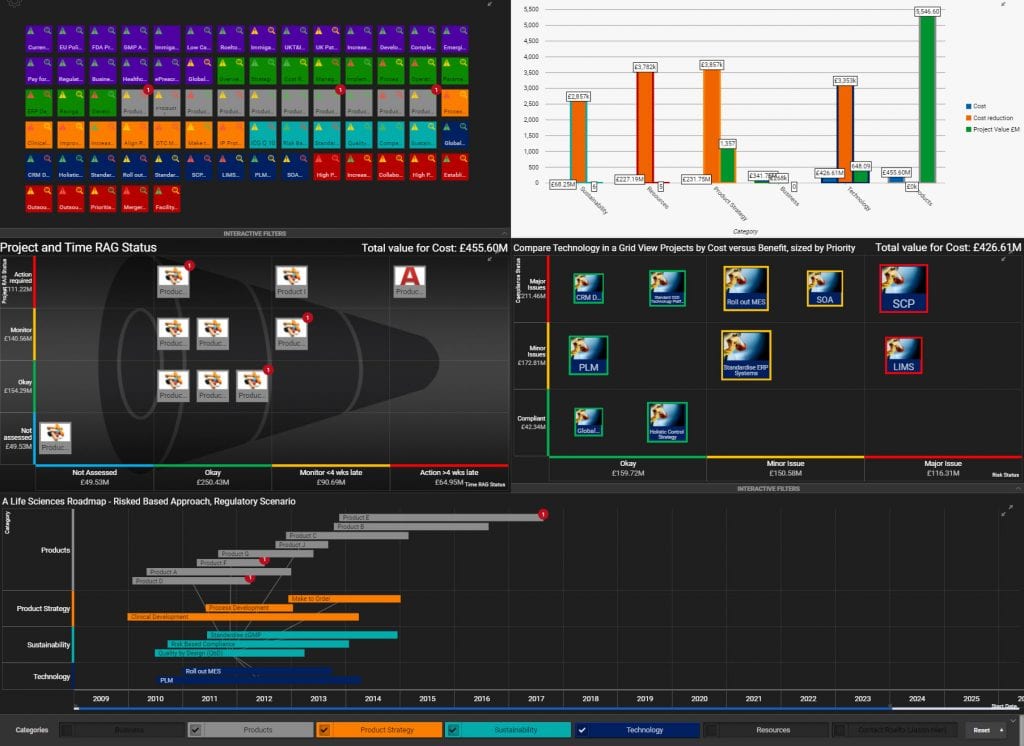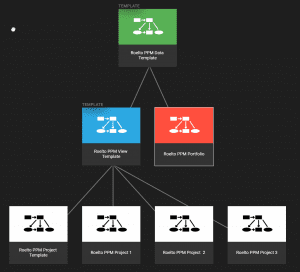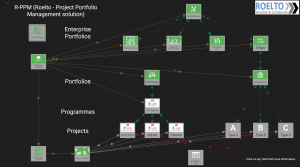“With SharpCloud I was able to capture every detail and reflect on the bigger picture at the same time.”
Create views your audiences understand
Visualise the same data in multiple ways to ease understanding and enable agile interaction with your project teams and stakeholders.

Visualise, share and collaborate
R-PPM is your project portfolio management platform hosted in the cloud. Project Managers can manage from anywhere, suppliers and contractors can update using dedicated project forms ensuring everyone is aligned and set up to deliver successfully.
Uncover insights, simplify complex decision making and see how you can increase your project performance.
Example of R-PPM, powered by SharpCloud
Feel free to interact with one of our R-PPM apps. Just point and click to navigate, filter and discover more.
R-PPM Overview and Functionality
Connect your project teams, leaders, customers and stakeholders so that they are all aligned.
Data uploads from other Line of Business Systems, teams members via forms, spreadsheets or lists ensures everyone is kept in the picture.
Click the R-PPM icon to learn more.
Overview
Projects typically include several areas that will need to be controlled, managed and reported on. These areas include costs, time, resources, risks, dependencies among others and will either be done manually by project teams using spreadsheets or a dedicated line of business system/tool e.g. Microsoft Project for planning and inhouse systems like HAAS for finance. In addition, Project Managers need to get/extract, load and transpose the data, information from these systems, combine it with Project Managers comments and insight to create a Project Status Report (PSR), usually in Word, Excel, or PowerPoint. This PSR is combined and summarised with other projects at a programme and portfolio level. All of which is done manually and repeated weekly, or monthly. Furthermore, data and statuses are continually changing so when finally published and reviewed it is out of date, increasing risk, uncertainty, and failure to deliver the agreed outcomes successfully.
R-PPM can be used across multiple sectors and eliminates these issues and more by using agreed data attributes and project view templates, which are inherited into a standard project template. Each project uses the project template no matter what type of project – construction, IT, transformation programmes so that there is consistency and standardisation across your team, project, programme, and portfolio. Figure 2: R-PPM structure illustrates a simple view of the R-PPM enterprise configuration.

Functionality
Key data from LoBS and other sources e.g. Excel tables, SharePoint Lists are uploaded into your project based on the data template (manually or automatically) or simply copied or entered/updated via the inbuilt online forms. Dedicated views for each project area are populated with the data. Standard views within R-PPM include:
- Overall Project Status – Dashboard with Red, Amber, Green (RAG) status, including commentary along with key performance indicators
- Project Plan Activities – Timeline view of project activities/Work Packages (WP) separated into “swim lanes” by project stage or Work Breakdown Structure (WBS)
- Milestones – Timeline view or table of when milestones are due and their RAG status
- Project Cost Summary – Table view of monthly costs Budget Forecast, Committed, Actual, Predicted, Variance, including RAG status and Business as Usual (BaU)/OPEX budget costs where applicable
- Project Spend to Date – multiple views including monthly bar graph, current month summary and commentary
- Risk Matrix – 5×5 grid “Risk Impact” and “Risk Likelihood”, along with a table of risks and number of monthly risks and issues, including RAG status, mitigation and due date
- Dependencies – A table of inbound dependencies where your project/team is dependent on another project delivered before your project can complete a task or deliverable. Outbound is the reverse. Dependencies to specific project activities within a project is also available.
- Benefits – a benefits dependency network provides a RAG status of Benefits linked to the project functions/deliverables, the project and business changes and how the benefits align to the project/business objectives.
- FTE Resources – A table of named resource types based on a 12 month look ahead including Planned, Actual, Variance and RAG status
- Project Change Log – Table of project changes including change details, status and decision.
- Action Tracking Log – Table of actions agreed at project reviews with person responsible, action, next steps due date and RAG status
- Highlights – Ability to raise specific points and details during reviews and link to other digital content such as images, PowerPoint presentations, projects, etc.
- Project Review – record minutes of meetings and review how well the project is performing and areas for improvement.
Using R-PPM you can very quickly start your Project Portfolio Management for multiple projects, programmes and portfolios, all linked to your business plans and overall strategy. The example below R-PPM Solution shows the overall configuration and data flows.

Click the icon
Jason helped us shape the #futprint50 roadmap into shape. He gave us great advice and helped us navigate from the general to the implementation.
He was also dedicated and a key element to the final product. I would welcome working again with him for a similar endeavour.
